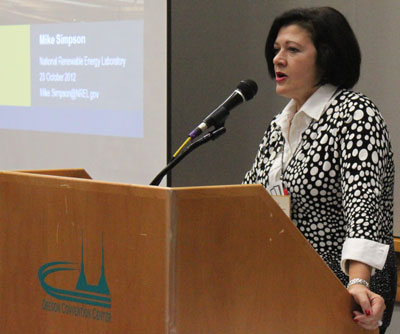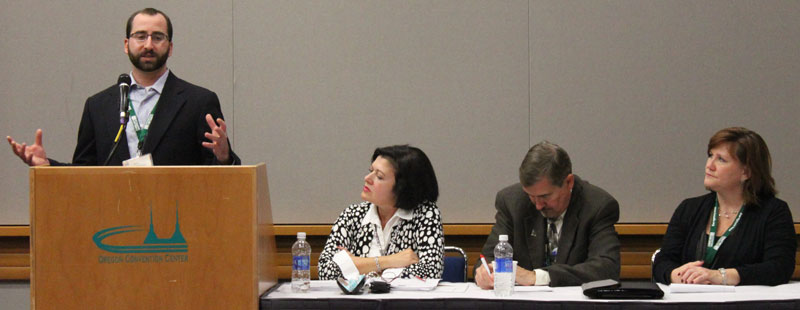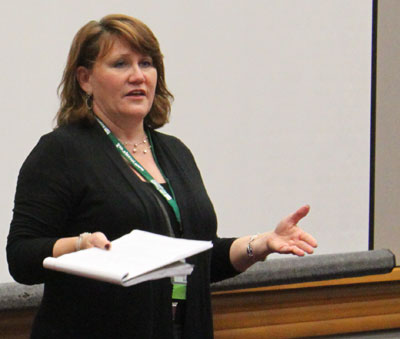
Code Council Legislative Initiatives
 |
|
Sara Yerkes, Senior Vice President, ICC Government Relations, opens this year's Government Relations Forum by explaining the role of ICC's Government Relations department. |
"We are the department responsible for code adoptions," Yerkes said. "We also are the face, eyes and ears of the organization. We interact with the Chapters, we manage relationships with the national organizations, with labor organizations... we interact with federal agencies, and state and local governments. We work with our Members hand and hand in the adoption of the I-Codes."
Dave Karmol, Vice President of Federal Activities, provided a brief legislative update.
The Centers for Medicare and Medicaid Services (CMS) is considering the International Building Code (IBC) and International Fire Code (IFC) as the only code compliance needed for its health care facilities. Currently those facilities must meet the National Fire Protection Association's (NFPA) Life Safety Code, even though the IBC and IFC cover many of the same requirements.
Karmol also reported progress on HR 2069, The Safe Building Code Incentive Act of 2011.
"[It] has 33 sponsors, 17 Republicans, 16 Democrats, almost even," Karmol said, "so it's a bipartisan bill. They are reintroducing it at the next Congress."
Also up for consideration is Senate Bill 1737, the Sensible Accounting to Value Energy (SAVE) Act, which would require home appraisals to reflect expected energy costs, allowing homeowners to recover investments in energy saving upgrades.
And this past summer, Congress passed, and President Obama signed into law, the Surface Transportation Bill (HR 4348), which re-authorizes the National Flood Insurance Program (NFIP) through 2017. As a result of stipulations in this bill, the ICC plans to work with U.S. Department of Housing and Urban Development (HUD) for guidance on the use of its Community Development Block Grant (CDBG), which provides funding for local building code programs. That will ultimately result in the publication, ICC Guidebook on HUD Block Grants for Local Code Programs.

Guest speaker Mike Simpson (left), from the National Renewable Energy Laboratory, the U.S. Department of Energy's primary national laboratory for renewable energy and energy efficiency research and development, speaks to attendees about electric vehicle servicing equipment and how that affects building codes. Sara Yerkes (second from right), Senior Vice President, ICC Government Relations; Dave Karmol (second from right), Vice President of ICC Federal Activities; and Maureen Guttman (right), Senior Director, Building Programs, and Executive Director, Building Codes Assistance Project, look on.
Simpson works with the Environmental Protection Agency's Clean Cities Program. Its mission is to advance the energy, economic, and environmental security of the United States by supporting local decisions to adopt practices that contribute to the reduction of petroleum consumption for travel. "The DOE sees electric vehicle technologies as a key enabler in reducing petroleum consumption," Simpson said. "These vehicles need power. They get it from the electric infrastructure, which is present in just about every building in this country right now. And in order to deliver that energy safely, and to deliver it regularly in a standard fashion, [we need] to collaborate with groups like the ICC to make sure the codes and standards are available. Together we can anticipate needs as the infrastructure for rechargeable vehicles rolls out in much broader areas."
 |
|
Maureen Guttman, Senior Director, Building Programs, and Executive Director, Building Codes Assistance Project, reports on how BCAP helps to advance construction codes by conducting advocacy activities on behalf of DOE through providing direct assistance to states, counties and cities. |
"BCAP's function is to get codes adopted," Guttman said, "(and) to get them enforced with compliance measures. We provide technical support and training. We are there to support you."
"We work closely with Sara's (Government Relations) team to help overcome misinformation. And (we) promote why it's in the best interest of the state, why it's in the best economic interest of the local community. We have tons of information and talking points on those kinds of things."
Yerkes shared an update on ICC code adoptions for 2012. So far, eight states—Delaware, Illinois, Maryland, Missouri, South Carolina, South Dakota, Washington and Wyoming—have adopted the code statewide. And 12 states have adopted at the local level: Alabama, Arizona, Colorado, Illinois, Iowa, Kansas, Missouri, Mississippi, Nevada, New York, Tennessee and Texas.
The recently formed Coalition for Current Safety Codes aims to advance safety by advocating for the adoption of current building, sustainability, electrical and life safety codes, and creating more public awareness and broader support for the adoption of the codes.
"We wanted to partner with local stakeholders," Yerkes said. "And we're working with the NFPA, Underwriters Laboratories, the National Electrical Manufacturers Association, 3M, etc. [We said], 'Why don't we form a collation, co-chaired by ICC and NFPA?' When the need arises, we can tap these groups and individuals to help states advocate for codes.
"This is the right time. We are so challenged with [not having] the resources that are needed to go around the country and have representation at all these different hearings and activities... [Expanding] our sphere of influence was one of the reasons for this Coalition."
Yerkes referred attendees to the Code Adoption Toolkit on ICC's website that contains briefing papers on technical issues, samples of ordinances, endorsements and support materials from national organizations.
Yerkes said Members should submit materials to include in the toolkit, statements, data, etc., anything that will assist states when they are going through any adoptions issue. "There's no point reinventing the wheel," she said.
Finally, Yerkes spoke about a project she describes as very dear to her heart – ICC's High School Technical Training Program (HSTTP).
"We are providing an opportunity for kids to learn the building code," Yerkes said. "We are giving them a leg up. What we give them is recognition for their program. And the kids go through a testing process, very similar to what building officials go through [with] the certification process. But we call it a certificate of achievement (COA)... If they pass the test, they get a COA. And we make sure they know they can continue the program, if they wish, through the ICC.
"I'm envisioning lots of future ICC Members because these kids, many of them are going to go on in the building trades. One of the selfish incentives is that we are also shaping the future of building codes in this country. By offering these opportunities to these technical high schools and working with the technical high schools, we are shaping some of these young people to come into our world."